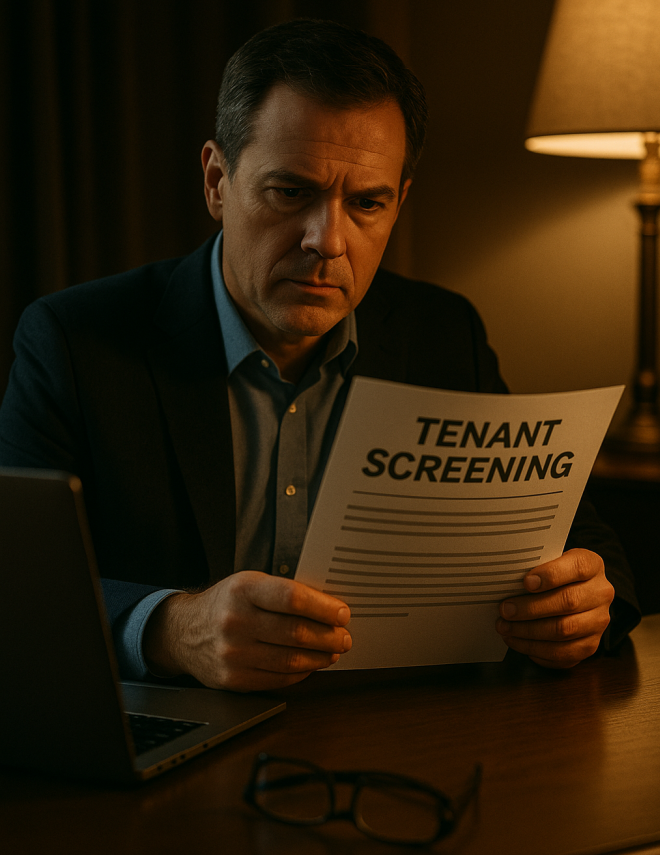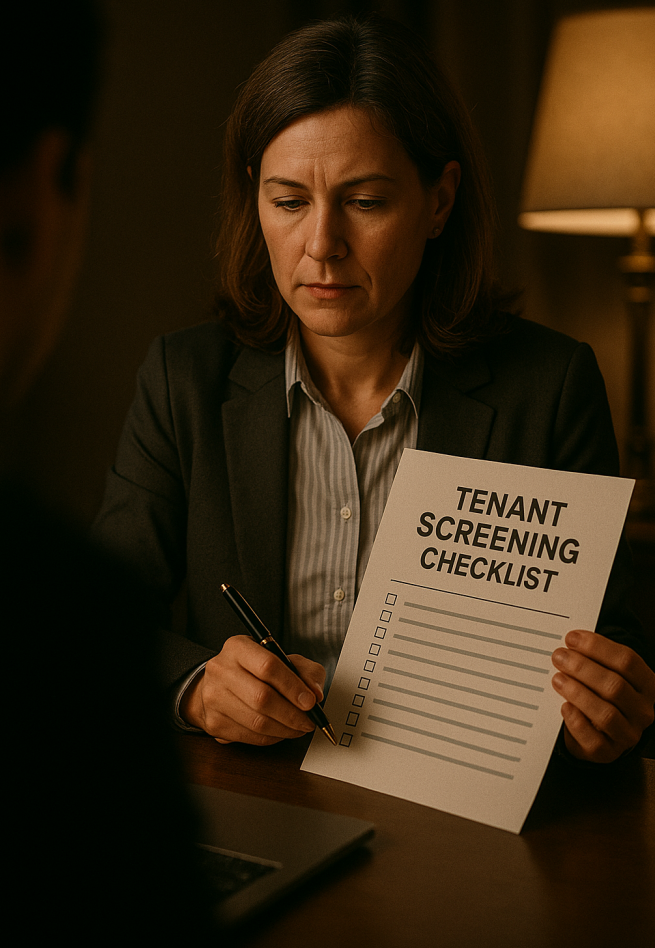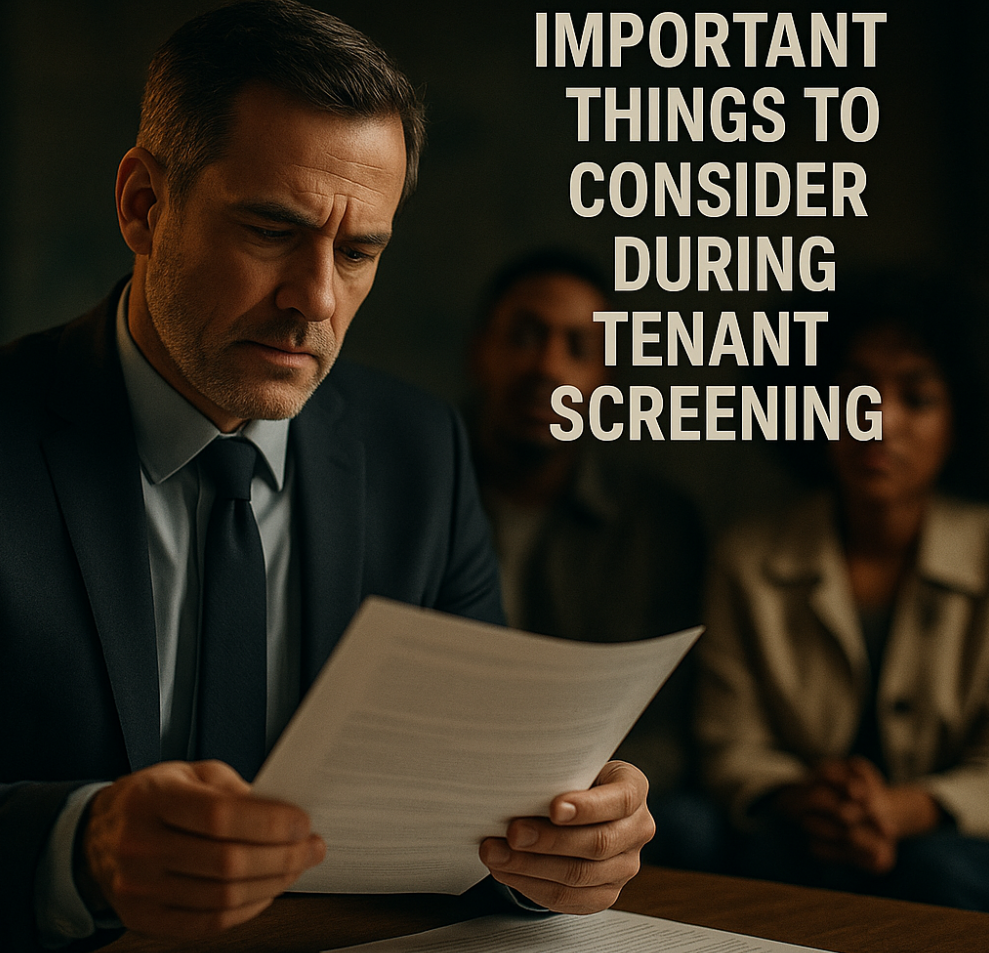Screening tenants is one of the best ways I know to keep rental headaches to a minimum. Being careful in a few key areas can help you avoid late payments, property damage, or even costly evictions. The Two biggest Fears for someone entering into Real estate investing where they are buying Rental properties are dealing with Tenants and Toilets!
Bad tenant selection over a number of years is not only costly, but it will end the career of an Investor. Over the years, I’ve found that a clear and thorough screening process can make renting out property a lot smoother and less stressful. Here’s my walkthrough on how to screen tenants so you feel good about who’s living in your rental.

Why Screening Tenants Matters for Landlords
Tenant screening is a process that helps landlords figure out who’s likely to take good care of the property and pay rent on time. It isn’t just about finding someone with enough money; you’re looking for renters you can rely on. Bad tenants can end up costing a lot in back rent, repair bills, and legal fees. That’s why knowing exactly what to look for and what steps to follow is really important.
The demand for rentals is high in many areas, and with so many applications, it can be tempting to accept the first person who seems friendly. I’ve learned firsthand that skipping a step or rushing the process almost always leads to trouble later. Careful screening helps weed out problems before they start and sets the tone for a good landlord-tenant relationship.
Key Steps to Screening Tenants to Reduce Risk
Screening tenants boils down to having a reliable system you follow every time. Here are the steps I always take (and recommend others use) when screening new renters:
- Start with a Strong Application: Use a detailed rental application form that asks for information on jobs, past addresses, landlord references, and more.
- Run a Credit Check: Review an applicant’s credit report to see how they’ve handled bills and obligations in the past.
- Check Criminal Background: Look for past criminal history that could present safety or property risks.
- Verify Employment and Income: Contact employers and ask for recent pay stubs or bank statements to make sure tenants can afford the rent.
- Contact Past Landlords: This can give you the real scoop on how someone treated previous rentals and whether they paid rent on time.
- Interview the Applicant: A direct conversation can help fill in gaps and get a sense for how the tenant communicates and handles responsibility.
Important Things to Consider During Tenant Screening

Landlords sometimes overlook certain areas that end up being really important. Here’s what I always keep an eye out for that can make or break the experience later on:
- Consistency in Stories: Make sure the rental application matches what comes up in background checks and during the interview.
- Red Flags in References: Slow or negative responses from past landlords or employers could mean problems.
- Credit Details: Not every debt or late payment is the same. Medical debt is very different from unpaid rent or evictions. Check out the details.
- Incomplete Applications: If an applicant skips questions or gives vague details, it’s fair to ask for more information. Gaps in employment or rental history should be explained.
Credit and Background Checks

A credit check will show you a potential renter’s credit score, payment history, and sometimes outstanding debts or other issues. Plenty of screening services let you run a soft credit check that won’t impact their score. When reviewing, I look for patterns of on-time payments and accounts in good standing. Past evictions or large debts are worth checking out further.
For background checks, most landlords focus on criminal records for actions that could threaten property safety or the peace of the neighborhood. Minor or dated offenses are less worrying than recent convictions for things like vandalism or violent crimes.
Verifying Income and Employment
Renters typically should earn at least three times the monthly rent. Check pay stubs, ask for employment letters, or even request recent tax documents if someone is self-employed. Directly contacting the employer can be really helpful for confirming that the job is stable and ongoing. In my experience, this is one of the simplest ways to make sure the rent will be paid every month.
Talking to Former Landlords
Reaching out to former landlords gives insight you just can’t get from a credit report. Ask if the tenant paid on time, cared for the property, and gave proper notice when they left. If someone can’t provide a previous landlord reference, that doesn’t end things. Just check out other areas or ask for extra references if needed.
Common Pitfalls and How to Avoid Them
It’s easy to skip steps if you’re in a hurry or dealing with a lot of applications, but that can end up causing way more hassle in the long run. I’ve seen plenty of landlords regret trusting their gut without getting the facts first. Here are a few common pitfalls to watch for, along with tips for staying on track:
- Skipping Background Checks: Always run background and credit checks, even if someone gives you a great first impression.
- Not Documenting Everything: Keep detailed notes and copies of all documents in case of disputes down the road.
- Failing to Follow Fair Housing Laws: Know your area’s fair housing laws and treat every applicant exactly the same to avoid legal headaches and keep things fair.
- Ignoring Gut Instincts Entirely: Facts come first, but if something feels off after you’ve checked the paperwork and references, it’s okay to move on to another applicant.
Fair Housing Laws and Legal Considerations
Staying within the law means treating applicants equally and using the same screening criteria for everyone. Discriminating based on race, religion, gender, national origin, family status, or disability is not allowed in the U.S. (and many other places). Focusing on things like rental history, creditworthiness, and financial ability keeps you on safe ground.
Tools and Resources for Tenant Screening
There are some handy tools out there that make screening faster, easier, and more reliable. Here are a few resources I reach for often:
- TransUnion SmartMove, for instant background and credit checks
- Avail, for automating rental applications and screening
- RentPrep, for super detailed reports and eviction checks
These tools often walk both landlords and applicants through the process step by step, saving time and reducing mistakes. They also keep sensitive info secure and make it easy to keep everything organized online. If you’re new to using these services, you’ll likely find them intuitive and a big timesaver as you manage a growing list of applicants or properties.
Plus, some of these services provide legal document templates, rental agreements, and automated messaging tools to help coordinate communication between you and your future tenant. You can even keep a digital file for each applicant, so everything is stored safely and accessible for future reference.
Frequently Asked Questions About Tenant Screening
Here are some common questions for those individuals interesting in becoming a Real Estate Investing Landlord. Here are some simple answers based on reviews from other Landlords and Property Management experts:
Question: How long should a tenant screening process take?
Answer: Usually about 2-5 days if everyone responds quickly and you use online screening tools.
Question: Is it okay to deny an applicant for bad credit?
Answer: Yes, as long as you apply the same rule to every applicant and have clear, written rental criteria in advance.
Question: What do I do if a tenant has no rental history?
Answer: Ask for extra references (like employers or personal contacts), confirm income, and interview the applicant. Sometimes everyone starts somewhere!
Question: Is there a best way to ask for references?
Answer: Yes. Always reach out directly by phone or email and ask clear, straightforward questions. For example, “Did the tenant pay on time?” or “Would you rent to this person again?” The more specific your questions, the better your information will be.
Question: How do I keep my screening process legal?
Answer: Document your process, use consistent criteria, and never ask questions that could be discriminatory. If you’re unsure, consult a local attorney or call your local housing authority for advice.
Final Thoughts on Screening Tenants
A solid tenant screening process can really cut down on problems, save money, and make being a landlord a lot less stressful. I always stick to a clear set of steps for every applicant, document everything, and focus only on facts I can check. With the right approach, you can find great renters who treat your property well and pay on time, year after year.
There’s a learning curve, but it’s worth the effort. Having a process makes a huge difference and helps you feel more confident with every lease you sign. If you don’t have a written screening system yet, now’s the perfect time to put one together.
Now, the Alternative to applying all of these Strategies would be to hire a Property Management company who can handle these tasks on your behalf. Just know that a typical Fee for Management companies will range between 8-10% of Gross Rents collected from your Tenants.
Having a Qualified Property Management company in place will lessen the load of daily Tenant Management and that in itself is worth its weight in GOLD! Just make sure you have enough of a Cashflow to afford the services of a Property Management company.
You should continuously build up your Emergency Reserves for future Maintenance issues and when the property needs to be “Turned Over”. This simply means a Deep cleaning process of the property internally to prepare for the next Tenant should they decide to leave or not renew their Lease.
However, completing the LandLord activities on your own can be accomplished. with the proper mindset. Taking those extra steps upfront gives a boost to your confidence as a landlord—and protects your investment for the long haul.

